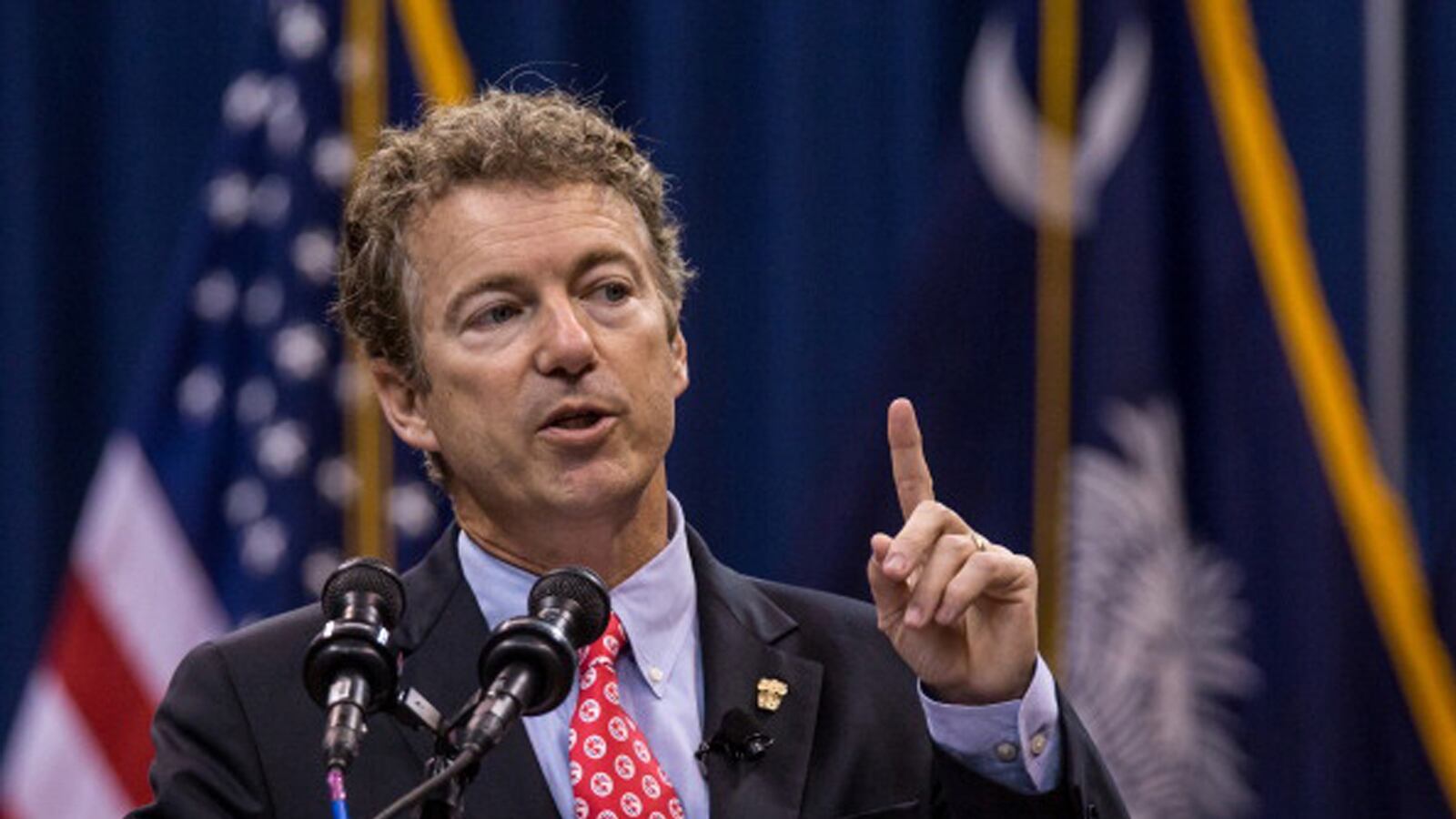Rand Paul got a little wild Friday night.
Kentucky's junior senator went on national television, announced he was suing the president of the United States, suggested the Director of National Intelligence and the nation's most prolific sharer of secrets share a prison cell, and took a step closer to the Republican nomination for the president.
So while most of America was thinking TGIF, Paul went on Hannity and announced that he and about 250,000 Americans are suing President Barack Obama and the NSA over the agency's collection of data through domestic surveillance, returning to the issue arena and theatrics that caused his profile to explode less than a year ago.
Paul loves to be underestimated, and he has demonstrated that he knows when and how to maneuver while his opponents are busy counting him out.
So despite whatever scars he has from 2013's plagiarism scandal, Paul's move Friday night could well keep him in 2016 GOP frontrunner neighborhood.
And by Saturday afternoon, he had another 50,000 people signed on to his suit against Obama through his Facebook page and the RAND PAC website. And he had another 50,000 email addresses collected with two years to go before the first presidential primaries.
So after a year of highs and lows matched by few others in American politics -- Obama, Mitt Romney or Marco Rubio -- Paul told his staff that 2014 would be about a return to the issues that got him elected to Washington in 2010.
While some of that means continuing to push for lower taxes and cutting spending while waging a ceaseless and seemingly losing battle against Obamacare, the heart of Paul's plan is to make Fourth Amendment and civil liberties issues central to his year.
Those are the issues that led Paul to his brightest moments in 2013, paving the way to Iowa, New Hampshire, South Carolina, and Nevada as he made more trips to early-voting states than any other potential 2016 candidate, as David Catanese pointed out on TheRun2016.com.
It has only been about nine months since Paul took a huge leap in his efforts to broaden his appeal beyond the Tea Party that sent him to Washington in the first place.
The senator's 13-hour filibuster of the confirmation of John Brennan to be CIA director last March was the catalyst. Almost overnight, Paul was leading early-state polls and talking openly about running for president.
It was a great summer for the junior senator. He was able to spread his wings and his voice became louder in the Republican Party until it seemed that he was setting the pace for Kentucky's senior senator and Senate Minority Leader Mitch McConnell, a remarkable trick for a freshman.
Paul balanced expanding his national profile with solidifying support in Kentucky, a feat made marginally more difficult by his early endorsement of McConnell which rankled some dyed-in-the-wool Tea Party members who want to upend establishment GOPers.
But for about a week in late October, Paul went on an informal listening tour of the Bluegrass, making 15 stops across the commonwealth as Kentucky became to Paul what the snowy mountains of Russia were to Balboa in Rocky IV. Stop after stop, folks who crowded diners and shook Paul's hand at Rotary Club luncheons urged the senator to run for president, and he almost seemed to be a man in training.
Just days later, Paul was smacked by his first national scandal. For about two weeks, the senator stubbornly fought back and forth with the national media over multiple examples of times the senator had lifted written works of others, culminating in a Meet the Press appearance in which Paul lamented the Kentucky state law that prevents the state's constitutional officers from having challenged someone or participating in a duel.
When the plagiarism dust had settled, or at least for 2013, Paul and his family had seen a different side of being in the national spotlight.
After a Louisville event in mid-November, the Lexington Herald-Leader asked Paul what lessons he had learned from the scandal.
"Not everybody likes me," Paul said laughing.
But less than a month later, Paul acknowledged in an interview that the idea of running for president and the media spotlight that comes with it doesn't appeal to him. But, he said, it would probably be worth it if he could talk about the Fourth Amendment and do some meaningful work to protect the right to privacy in the Information Age.
For all his criticisms of Paul, John McCain might be best suited to explain to Paul what happens when a maverick gets out of the mosh pit and up on the stage.
When Paul made the same joke in late November that he was making in late October about his wife, Kelley, having both votes in his house about whether he runs for president, it had a deeper meaning.
People close to the Pauls say the senator isn't playing the usual coy song-and-dance about how family considerations might keep them for running. Kelley Paul has genuine concerns about the impact a run would have on her family, and they are serious about making the decision together.
But Paul and his advisors aren't going to wait for a decision to put the pieces in place should he decide to run.
The Lexington Herald-Leader reported in early December that Paul had settled on Louisville as a headquarters for a 2016 run, but he noted in an interview that he'll need a headquarters to run for his Senate seat the same year and "there's a lot of overlap."
A mid-December Public Policy Polling survey found that only 35 percent of Kentuckians want Paul to run, but only 54 percent of respondents said they voted for Mitt Romney in 2012 when the actual number was closer to 61 percent.
At a stop in early December in the Tea Party-rich area of Northern Kentucky, Paul was making his way around the crowd at Miss Shirley's Bakery in Alexandria when he interrupted a conversation between Campbell County Judge Executive Tim Nolan and a little girl named Kathleen Ledford.
Nolan had asked the child who would be the next president.
"George Washington," she said.
Everyone laughed, and after Nolan had gently corrected Ledford, he asked her again who the next president would be.
"Rand Paul," she said.
"There you go," Paul said.
So while the senator wants to spend 2014 refocusing on what got him to Washington to begin with, he's certainly not ignoring a possible run in the process.
RAND PAC will amp up its fundraising operation this year, and Paul has a heavy travel schedule that includes fundraisers and appearances for midterm congressional candidates and state parties, most of it scheduled for later in the year.
Perhaps the best news for those standing with Rand, though, is that less than a week into the new year, Paul has marked out territory as the guy in his party suing Obama, and it's over an issue that Paul loves to talk about and polls well way outside of the confines of the Tea Party.
It's a wild way to start off a new year. It's an even wilder way to start winning support for a presidential run.
Sam Youngman is political writer for the Lexington (Ky.) Herald-Leader.






